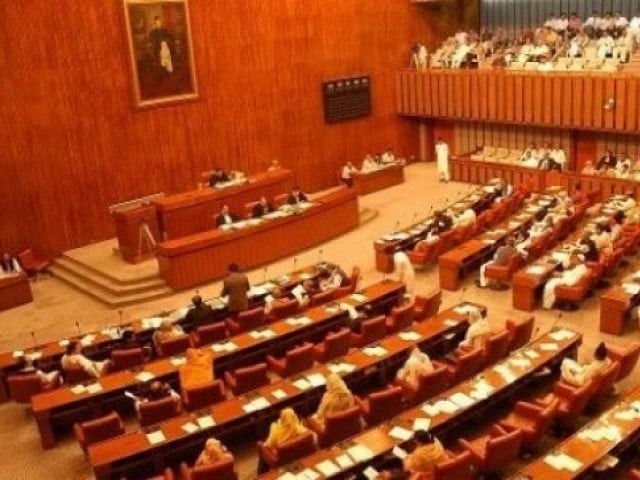Senate boasts 111 days of sessions in 16th parliamentary year
13 regular sessions and two joint sittings were held

Senate of Pakistan PHOTO: FILE
According to the information shared by the Senate Secretariat about time duration and performance of the House during the parliamentary year, 13 regular sessions (275 to 287) and two joint sittings were held.
These sessions were based on 111 working days comprising 78 sittings with a total of 203 hours and 10 minutes.
The maximum attendance of 103 out of the total membership of 104 in the House was recorded on March 12, 2018 during the 275th session while the minimum attendance of 25 lawmakers was recorded on July 20, 2018 during the 280th session.
Senate panel expects Rs120b tax collection from cigarette industry
Throughout the year, the average attendance of lawmakers remained 64.46 per cent while the average hours of sittings were two hours and 36 minutes.
The House ensured punctuality during the year and sittings began with an average delay of less than one minute.
The legislation enacted during the 16th parliamentary year focused on strengthening social contract between legislators and constituents.
The members of the House continued to act as agents of people and ensured that their rights are protected by the executive.
Furthermore, parliamentarians initiated a series of legislation aimed at not only addressing the lacunas in the existing legal framework but also introduced laws which were reflective of the evolving demographic and socioeconomic realities.
According to the secretariat, 28 private members' bills and 15 government bills were introduced in the Senate. The House passed five government bills introduced in the Senate while five private members' bills were also passed.
The House witnessed presentation of seven ordinances and six private members' bills introduced in the Senate became Acts.
The Senate received seven government bills from the National Assembly during 2017-18 which were passed during the parliamentary year while seven other bills received from the National Assembly during 2018-19 were also passed.
According to the secretariat's website, the Senate received 3,681 starred questions of which 3,301 were admitted. Of them, 702 were responded to by minister of the concerned division/department/ministry, and 19 were referred to the concerned standing committees of the House for further consideration.
A total of 322 resolutions were received by the secretariat of which 266 resolutions were admitted by the House.
Of them, the House passed 31 resolutions while six were dropped because of the absence of the relevant senator and 29 were later held as inadmissible on technical grounds.
The remaining resolutions lapsed during the year. The subject matter of the resolutions varied from the socioeconomic issues faced by the public at large to the issues pertaining to national security.
The House discussed 11 motions under Rule 218 while four were referred to standing committees and three were dropped by the House.
A total of 361 motions under Rule 218 also lapsed during this period. The motions discussed in the House concerned the taxes levied on petroleum products, the healthcare system in the country, the depreciation of the rupee, the law and order and political situations, the low gas pressure in winter, the energy crisis, loans from foreign sources, the foreign policy in connection with conflict in the Middle
East, the sit-in by religious parties, the violation of human rights in Indian-occupied Kashmir, the ecological environmental changes arising out of climate change and report of the State Bank of Pakistan about the possible increase in the inflation rate.
During the Parliamentary Year 2018-19, the secretariat received 155 adjournment motions. Under the rules and standing orders, 38 adjournment motions were set down in the orders of the days for the determination of admissibility. A total of 21 adjournment motions were admitted on the issues of great national importance whereas 14 were discussed in the House and nine dropped because of the absence of the members concerned.
A total of 111 adjournment motions were held out of order as they could not fulfill the criterion of admissibility laid down in the rules and procedure.
Seven adjournment motions lapsed as they could not be set down in the orders of the day.
The secretariat received 219 call-attention notices on various issues, of which 134 were found in order under the rules and procedure. Of the admitted notices, 68 were set down in the orders of the day. Ten notices were referred to standing committees for consideration.
During the parliamentary year, the secretariat received 17 notices of privilege motions of which four motions were moved by the members concerned in the House. After the determination of their admissibility, they were referred to the Committee on Rules of Procedure and Privileges.
The remaining 13 motions have not so far been moved by the members concerned. Points of public importance remained an important tool whereby the members of the Senate discussed and debated a range of issues affecting the common person.
Furthermore, the adverse impact of policies of various government and regulatory bodies on the vulnerable segments of the society were also highlighted. During the parliamentary year, points of public importance were raised during Zero Hour whereby ministerial response was sought for 15 of these and the remaining 37 were referred to the committees concerned.



















COMMENTS
Comments are moderated and generally will be posted if they are on-topic and not abusive.
For more information, please see our Comments FAQ